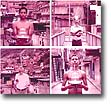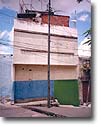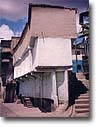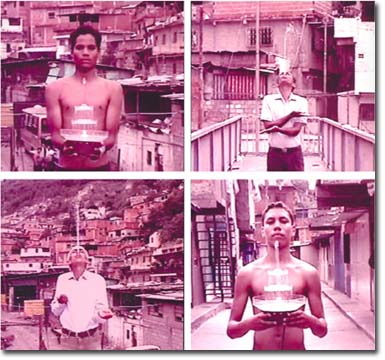Sala Mendoza ,
Jul 15, 2004 - Sep 15, 2004
Caracas, Venezuela
Caracas Suite, on modernity and its ruins
by Karina Sainz Borgo
The Caracas Suite showcase marks, without doubt, another direction in the artist's work. In his first pieces, Apóstol focused his gaze on a reflection, on the individual, and on the idea -and characterization- of the stereotype of Latin American masculinity. With a very sharp edge, black humor and the use of photography as a conceptual tool, Apóstol dedicated himself to decoding the domestic environments in relation to popular and urban culture. However, during the past four years a significant change has taken place within his artistic production, progressing towards an investigation of symbolic elaborations and representative strategies which take public space, architecture and urbanization as metaphors of an implanted historical and cultural model, one whose demolition now becomes a symbol of aesthetic interest.
Apóstol had already, in his W.W, Jackson Inc. (2000) series, touched on the assimilation of identity from other angles, a theme which becomes more evident in Residente Pulido (2001). Contained in Caracas Suite are a series of photographs of modern Caracas buildings, digitally prepared, their facades becoming a sealed block covered by a kind of varnish which emphasizes the play of opposites on solidity and fragility, a kind of dilemma representing the forming of individual identities and spaces within the urban context. This "sealed" concept of buildings which represent a moment when Venezuela was evolving from a rural to an urban society, is applied in Residente Pulido Ranchos, where the informal dwellings and shacks appear as a symbol of the demolition of a model country, and also of Society as a whole.
"Caracas Suite," continues Ruth Auerbach, curator of the showcase, "represents a sharp and penetrating reflection on numerous social themes and, why not say so, on the very notion of Venezuelan identity. (...) The metamorphic representations by Apóstol inquire into the concepts of memory and identity as arguments for indicating the essential vulnerability of these concepts". Alexander Apóstol recently stated his interest in this subject in the magazine Art-Nexus No 53, an interest which has also become a line of work assumed by other Venezuelan and Latin American artists. "These buildings", explains Apóstol, "were built within completely spontaneous parameters in accordance with the immediate needs of the dwelling owner/builder, both as regards their structure and in formal approaches, a modern tradition in line with that of buildings erected in the city's valley", commented Apóstol on the occasion of Residente Pulido and Residente Pulido. Ranchos, recently at the Cuenca Biennial.
Within the framework of the Caracas Suite exhibition, Apóstol prepared a Project Room in which he incorporated a new proposal to his research. He selected the Campo Alegre de Caracas urban development, planned by the Architect Mujica Millán as one of the symbols representative of the "modern metropolis", a space for creating and fostering interventions "in situ", making manifest not only the elimination of an urban model, but also the symbolic power of its ruins.
|













